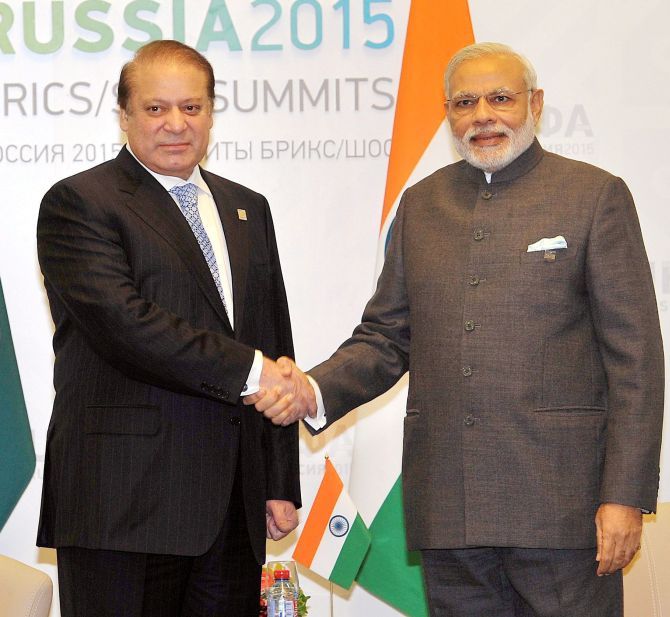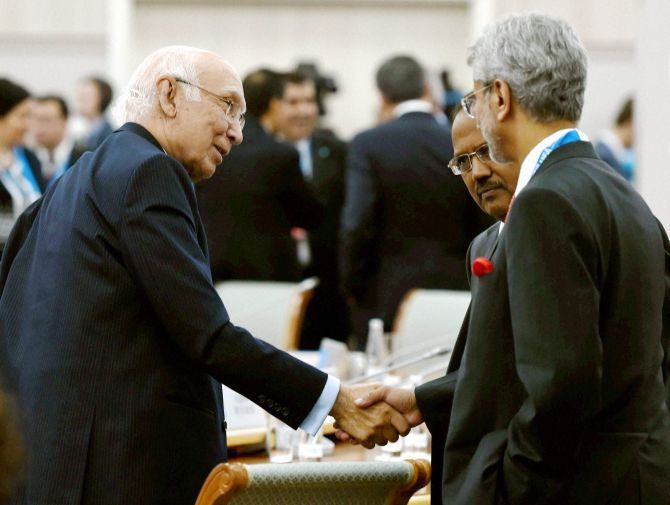On the sidelines of the SCO visit in Ufa, the two heads met and decided to revive dialogue and find ways to expedite the trial of the Mumbai attacks.

Breaking the deadlock, India and Pakistan on Friday decided to revive the stalled dialogue process and find ways to expedite trial of the Mumbai attack case at talks between Pakistan Prime Minister Nawaz Sharif and his Indian counterpart Narendra Modi who agreed to visit Pakistan next year for the South Asian Association for Regional Cooperation Summit.
Modi and Sharif, in their first bilateral talks in over an year, met for nearly one hour at Ufa’s Congress Hall on the sidelines of the Shanghai Cooperation Organisation summit and decided that National Security Advisers Ajit Doval and Sartaj Aziz will meet in New Delhi either next month or in September to discuss “all issues connected to terrorism”.
The decision is crucial as Aziz is a well-respected person in that country and trusted by the Pakistan Army, sources said, adding he is the right man for the task.
The two leaders focused their discussions mainly on terrorism, which India has been projecting as the core issue bedevilling Indo-Pak relations.
Modi and Sharif had held bilateral talks in May last year in New Delhi when the Pakistan PM came to attend swearing-in ceremony of the Indian leader. They came face-to-face in Kathmandu in November last for the SAARC Summit but only exchanged pleasantries.
Foreign secretaries of the two countries were to meet in August last year in Islamabad but the talks were cancelled by India, which protested the Pakistani envoy in Delhi meeting Kashmiri separatist leaders ahead of the parleys.

A one-page joint statement outlining a five-point roadmap issued after the Modi-Sharif meeting said, “Both sides agreed to discuss ways and means to expedite the Mumbai case trial (in Pakistan), including additional information like providing voice samples”.
India has been upset over the almost non-existent trial in the 2008 Mumbai attack case, with even the mastermind and Lashkar-e-Tayiba operations commander Zakiur Rehman Lakhvi being released by the court as the Pakistan government failed to furnish the required evidence.
The joint statement also spelt out a number of decisions, including early meetings of Border Security Force Director General and his counterpart from Pakistan Rangers followed by that of DGMOs.
Significantly, there was no mention of Kashmir in the joint statement or at the joint press briefing by Foreign Secretaries S Jaishankar and Aizaz Ahmad Chaudhry.
Modi, who accepted Sharif’s invitation to visit Pakistan for the SAARC Summit in 2016, will be the first Indian PM in 12 years to travel to that country after Prime Minister Atal Bihari Vajpayee's historic visit in January, 2004.
The two leaders agreed that India and Pakistan have collective responsibility to ensure peace and promote development. To do so, they are prepared to discuss all outstanding issues, the statement said.










 © 2025
© 2025